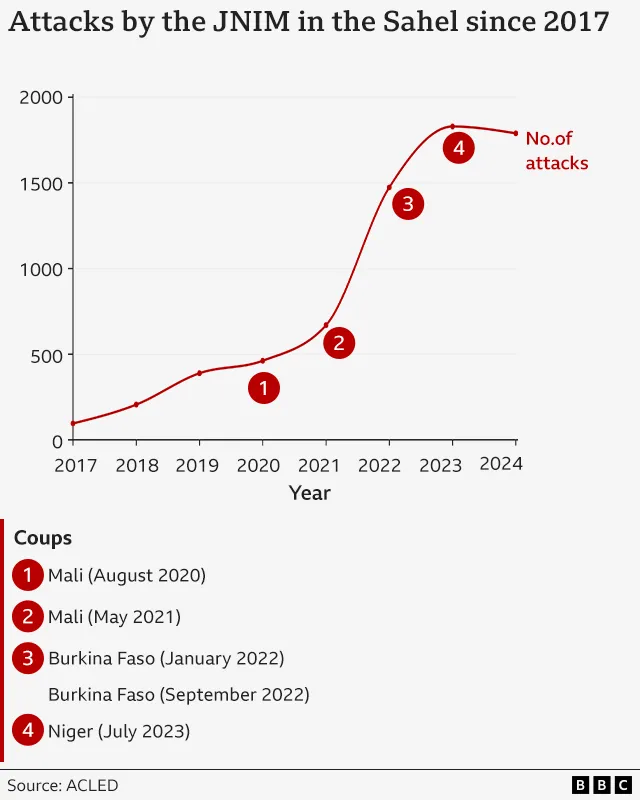JNIM: How an Al-Qaeda Offshoot Became Africa’s Deadliest Militant Force
In the heart of West Africa, a complex and deadly conflict is unfolding, largely driven by an entity that has rapidly risen to prominence: Jama’at Nusrat al-Islam wal-Muslimin (JNIM), an affiliate of Al-Qaeda. This militant group has become the primary force behind a disturbing surge in jihadist attacks across several West African nations, most notably Burkina Faso, Mali, and Niger. The escalating violence not only destabilizes the region but has also been a significant factor in the political upheaval, including multiple military coups, that have swept through these countries in recent years. Despite changes in leadership, the juntas have so far proven unable to contain the escalating threat posed by JNIM.

JNIM, which emerged as a coalition of five jihadist groups in Mali in 2017, has transformed into one of Africa’s most formidable and deadly militant organizations. Its origins lie in the unification of Ansar Dine, Katibat Macina, Al-Mourabitoun, Ansar al-Islam, and the Sahara branch of Al-Qaeda in the Islamic Maghreb. This consolidation occurred following the French military intervention in northern Mali in 2012, which displaced various jihadist and separatist factions. The group is currently led by Iyad Ag Ghali, a former Malian diplomat and prominent Tuareg figure who was a key player in the 2012 Tuareg uprising seeking an independent state of Azawad. His deputy, Amadou Koufa, hails from the Fulani community. Experts believe that the central leadership provides strategic direction to its decentralized branches operating throughout the Sahel.
The group’s objectives are clear: to dismantle the existing governments in the Sahel and establish a strict Islamic caliphate governed by its interpretation of Sharia law. This ideology often clashes with the traditional practices of local communities. JNIM has been known to enforce stringent dress codes, prohibit music and smoking, mandate beard growth for men, and restrict women’s public presence. While these practices are not universally popular, their appeal can increase in areas where state institutions fail to provide basic services or justice, making Sharia courts a seemingly attractive alternative for some disillusioned populations. The group’s strength is estimated to be in the thousands, largely comprising young men and boys drawn to its cause by a lack of economic opportunities in the impoverished region.
JNIM’s operational reach has expanded significantly beyond its initial strongholds in central and northern Mali. It now exerts considerable influence across Mali, Burkina Faso, and Niger, and has conducted operations in neighboring countries such as Benin, Togo, and Ivory Coast. Burkina Faso, particularly its northern and eastern regions, has become the epicenter of JNIM’s activities. This expansion is attributed to internal divisions within Burkina Faso’s military and the group’s deep-rooted connections within local communities, which facilitate recruitment and garner sympathy. JNIM effectively exploits local grievances to advance its agenda.
The intensity and scale of JNIM attacks have escalated dramatically in recent months. In the first half of 2025 alone, JNIM claimed responsibility for over 280 attacks in Burkina Faso, a twofold increase compared to the same period in 2024. The group has also reported causing significant casualties across the Sahel, with estimates suggesting nearly 1,000 deaths attributed to its operations since April, primarily targeting security forces and allied militias. Burkina Faso accounts for the majority of these casualties, followed by Mali and Benin. This alarming uptick in activity, characterized by the use of improvised explosive devices (IEDs) on key routes, attacks on military bases for arms, and targeting of civilians perceived as government collaborators, highlights JNIM’s strategic ruthlessness.
Compounding the security challenges, militant groups like JNIM are reportedly leveraging advanced technology, including Elon Musk’s Starlink satellite internet service, to enhance their operational capabilities. Smuggled Starlink devices provide high-speed connectivity in areas with unreliable or non-existent mobile networks, enabling better coordination, intelligence sharing, recruitment, and financial transactions, even during active combat operations. This technological adaptation poses a new frontier in counter-terrorism efforts.

JNIM sustains its operations through diverse income streams. While kidnapping foreigners for ransom was once a significant source, the deteriorating security situation has reduced the number of expatriates in the region. Consequently, cattle rustling has emerged as a primary revenue source, with JNIM reportedly earning millions of dollars annually from livestock theft. Additionally, the group imposes various taxes on local economies, including on gold mining and other goods transiting through its territories. They also implement “protection” taxes and operate blockades, extorting money from individuals and businesses. These financial mechanisms are critical to maintaining their prolonged insurgency.
International efforts to combat JNIM have faced significant challenges. France’s decade-long military presence in the Sahel, aimed at counter-insurgency, yielded limited long-term success. Similarly, the G5 Sahel Task Force, a regional military alliance, has been weakened by the withdrawal of key member states, including Mali, Burkina Faso, and Niger. The departure of the UN peacekeeping mission, MINUSMA, from Mali at the end of 2024 further complicates the security landscape. Analysts suggest that a purely military approach may be insufficient, advocating for negotiation as a potential long-term solution to end the group’s influence.
The series of military coups in Mali (2020, 2021), Burkina Faso (2022), and Niger (2023) have inadvertently created an environment conducive to the growth of militant groups like JNIM. The subsequent instability and governance vacuum, coupled with the replacement of French forces with Russian support (notably the Africa Corps), have altered the regional security dynamics. Efforts to bolster national armies, such as Burkina Faso’s recruitment of 50,000 “volunteers,” have been marred by allegations of forced conscription and inadequate training, leading to high casualties among new recruits and making them vulnerable targets for JNIM. Furthermore, human rights organizations have raised serious concerns about atrocities committed by military governments against civilians, particularly the Fulani ethnic group. These documented instances of extreme violence, allegedly responsible for thousands of civilian deaths in Mali alone, fuel local anger and resentment, creating fertile ground for JNIM recruitment and further destabilizing the region.
For more in-depth reporting on Africa’s evolving security landscape, visit BBCAfrica.com and follow BBC Africa on Twitter, Facebook, and Instagram.
You may also be interested in:
- How ‘blood gold’ is fuelling conflict in West Africa
- ‘I thought I would die’ – freed captive tells BBC of life in jihadist base
- Why Burkina Faso’s junta leader has captured hearts and minds
- The region with more ‘terror deaths’ than rest of world combined



Post Comment